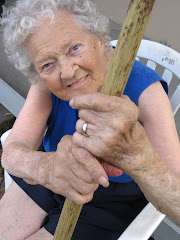My Mom has epilepsy and this complicates her care. She is fortunate that her epilepsy has been easily controlled with one type of medication; others are not so fortunate. In the big scheme of things Mom has had few grand mal seizures but when she does it's a doozy. Her blood pressure shoots way up and the risk of stroke is huge. She didn't always have epilepsy; her condition is the result of brain damage after a stroke during childbirth at age 42. Her grand mal seizures present the same symptoms she had during the stroke: terrible headache, vomiting, left side numbness followed by paralysis and finally unconsciousness. As she ages we have two main concerns; one is a regular schedule of medication to maintain an adequate level of dilantin in her blood stream and, secondly, we want to ensure that she's closely monitored for changes in her seizure process.
I use the word "process" because it seems that her seizures have always followed the same pattern. If we ( my dad, brother or myself ) could intervene early enough in the process, we could prevent the seizure. She might still have a headache, some "wavering" in her voice, some disorientation but no grand mal seizure. We generally gave her another pill, perhaps something sweet to eat, a drink of water, some TLC and rest. She would most often be just fine. Now that Mom's cared for my others, there is a chance they won't recognize the subtle signs of an oncoming seizure. If her seizures become less violent and more frequent, we want to know that someone is aware of the change. At home, we quickly noticed Mom's slight disorientation, her failure to respond quickly to questions or discussion, the dazed look in her eyes. All of these now seem like typical "old age" to someone unacquainted with Mom. She also realizes something is wrong and would tell us early that she didn't "feel right". My great fear is that her request will be attributed to a "lonely old lady" and she'll be ignored.
On a few occassions in the past 5 years I've noticed more subtle seizures. Mom would look dazed and bob her head up and down yet still be able to hear and talk. When asked a question she would try to focus her vision on me but could not; she just seemed "out of it" and her grip on her left hand would be very week. I'd try to get her to eat something sweet, have a drink of water and a rest. Usually after 40-60 minutes of sleep she'd wake up and not remember our discussion or that she had a snack. The frustrating part about this change in her seizure activity is that we can't easily make care givers aware of these symptoms unless we are there as it happens. There's also high turnover in aides and some times nurses, so we have to repeat this over and over. Lucky for Mom, I'm tenacious. I will tell them over and over. I ignore the eye rolling, the smart ass remarks and tell them, how serious this is for Mom. It's a matter of life or death for her so I expect them to do their best. I don't expect miracles but I do expect them to respond to her requests and her symptoms.
Subscribe to:
Post Comments (Atom)






Hi Lynn,
ReplyDeleteMy elderly mother has been in a facility for one year; previous to that I was her caregiver at her home for over two years. I can definitely relate to your concerns that the present caregivers just don't know your mother as well as you do and so are less likely to recognize signs that something is amiss.
I had to chuckle at the last part of your post. "Lucky for Mom, I'm tenacious...". Keep up the good work!! That's what it takes to be an advocate that's listened to these days!
Jan Heinen
Publisher, LiftChairReviews.com